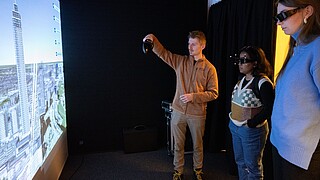According to Alex, neuroforecasting and machine learning can help to predict music hits or misses in two ways: 1) being able to make more sophisticated analyses and get better understanding from the data that already exists; and 2) on the neuroscience side, by giving us a window into the hidden information about human preferences that we can add to that data. Here is Alex’s take on some of the issues discussed.
RSM: When it comes to backward engineering songs or the keys of songs into individual components, can you see whether a certain element, like adding a high string to the chorus, will get a stronger audience reaction or make a song more popular?
AG: That’s the direction we’re going. The idea is to build up a knowledge base and library that will enable us to analyse a song and get a prediction of listener response based on what we know from other songs. This already exists for visual stimuli, where we can use predictive algorithms to predict visual attention and engagement. Predictive music would be an auditory extension along the same lines.
Then what other aspects of the music industry, that don’t necessarily have to do with the individual success of a song, would benefit from machine learning?
Songs are rarely experienced in isolation; they are tracks on an album or a DJ’s set list. Any good DJ knows that the key is to lead people on an emotional journey, in part by spacing out the highs and lows and letting people reset emotionally before bringing them back up again. Machine learning could be used to optimise this pattern, not in terms of a single song but in terms of an entire emotional experience. The algorithm can be customised and optimised so that the emotional journey over the course of the DJ’s set enhances the experience of the listeners.
So now comes the meatier question: could AI replace song writers and musicians, for example? How far do you think machine learning will go in the music industry?
Understandably, there’s a concern that AI will increasingly replace people across domains, and in the music industry in particular. But it’s important to remember what AI is good at, which is organising, analysing and manipulating large amounts of data. By definition, AI is derivative; it’s only as good as the information it has been given and what you tell it to do with that information. At this stage, it seems unlikely that AI will replace the innovation aspect of music. AI might help song writers, DJs and musicians to be quicker in doing the things they want to do, and in a more technical way that wasn’t possible before, but the innovation and vision in seeing where the music is going to go will still be driven by human input.
Good point. So then, what’s the end goal for using technology to predict music hits or misses?
The goal is to use the accumulated knowledge and technology to offer tools, like the ones I’ve mentioned before. Tools that can give you an idea, or at least a starting point, for how your music might be received by the marketplace of listeners. The idea is that it would be something that could aid in the generative creation process. Not dictate that process but give creators more information for things like pilot testing a new song before going public. By getting a general reaction to other music and other stimuli, creators can get hints about what they could then expect.
Could this also be applied to songs from the past that may have been overlooked when they were new? How could predictive modelling breathe new life into past overlooked songs?
The things we want to predict, the preferences and choices, aren’t static in time. A song may elicit a certain reaction from listeners at one time and then a very different reaction at another time in the future. For example, think of music that was ahead of its time and then had its moment years later. We could now feed that older catalogue of songs into a model, and have it tested to see if it’s now getting a response that suggests it will be successful which it might not have had in the past.
And what about platform personalities – like YouTubers or SoundCloud – who have vast numbers of followers who would buy their newly released songs or albums en masse, just because the follower likes the platform personality. How do AI and machines listen to the music and still take into account the pre-existing context of the artist’s popularity to predict a hit, even if that artist’s music is, well, average?
If you think about it, there are two ways to predict musical success. You can look at the outcome measures, like the metrics of shares, likes and sales. Or you can look at the components of the music and the responses to the music itself. I think it’s pretty clear that the best predictive models are going to incorporate both of these. So, while one might not be able to pick up on the audience that already exists, that’s something the other can do because it knows about the artist’s community, how much they share, how actively they support their artists, et cetera. A combination of the two methods will result in the best prediction.




